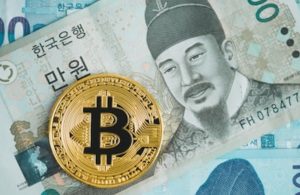Latest news about Bitcoin and all cryptocurrencies. Your daily crypto news habit.

South Korean banks are reportedly taking measures to limit services for customers who are not using the real-name system. It has been over seven months since the Korean government introduced the crypto real-name system, but only 40-50% of accounts at the country’s top four cryptocurrency exchanges have been converted into real-name ones, according to local media.
Also read: 160 Crypto Exchanges Seek to Enter Japanese Market, Regulator Reveals
40-50% Conversion Rate
 It has been more than seven months since the South Korean government introduced the real-name system for crypto exchanges at the end of January. Investors who have not converted their virtual crypto accounts into real-name verified ones cannot deposit Korean won into their accounts; they can only withdraw them.
It has been more than seven months since the South Korean government introduced the real-name system for crypto exchanges at the end of January. Investors who have not converted their virtual crypto accounts into real-name verified ones cannot deposit Korean won into their accounts; they can only withdraw them.
The government intends for all crypto exchanges to use the real-name system. However, in reality, only the country’s largest four crypto exchanges – Upbit, Bithumb, Coinone, and Korbit – have been able to offer the conversion service to their customers.
Money Today reported on Monday, September 10:
Although the name verification service has been in operation [for] more than half a year since its inception, the conversion rate to the real-name verified accounts for each exchange site is only 40 to 50%.
 To convert an existing virtual account into a real-name verified one, the trader must open an account at the bank which has a real-name conversion agreement with the exchange. For example, Bithumb has an agreement with Nonghyup Bank. So far, banks have been providing this service to only the country’s top four exchanges.
To convert an existing virtual account into a real-name verified one, the trader must open an account at the bank which has a real-name conversion agreement with the exchange. For example, Bithumb has an agreement with Nonghyup Bank. So far, banks have been providing this service to only the country’s top four exchanges.
Under the real-name system, customer deposits at crypto exchanges are matched with information on their bank accounts.
However, the news outlet explained that “many investors do not convert to a real-name verified account but invest only with the funds they have already deposited [at crypto exchanges].”
Banks to Limit Services for Unconverted Accounts
 A bank official told the news outlet that customers who continue to use virtual crypto accounts, and not real-name ones, are at higher risks of money laundering, adding that banks are now urgently taking measures to increase the conversion rate.
A bank official told the news outlet that customers who continue to use virtual crypto accounts, and not real-name ones, are at higher risks of money laundering, adding that banks are now urgently taking measures to increase the conversion rate.
According to the banking industry, banks are demanding that crypto exchanges with real-name conversion service ask their users who have not converted their accounts to do so. Noting that it is banks’ policies “to increase the transparency of virtual currency transactions and, above all, to prevent money laundering,” the news outlet elaborated:
Banks will take measures to limit services unless they (customers with virtual accounts) switch to real-name verified accounts by a certain date. After a certain point in time, [if] new real-name verified accounts are not issued, some restrictions on the Korean won deposit / withdrawal will be considered.
The publication added that “It is expected that restrictions will be imposed as early as November.”
Efforts by Exchanges
 To encourage conversion to real-name accounts, Bithumb has lowered the daily Korean won withdrawal limit by 10% for those accounts that have not converted, the news outlet conveyed. The exchange also plans to take additional measures on users that do not switch to real-name verification accounts.
To encourage conversion to real-name accounts, Bithumb has lowered the daily Korean won withdrawal limit by 10% for those accounts that have not converted, the news outlet conveyed. The exchange also plans to take additional measures on users that do not switch to real-name verification accounts.
The Kakao-backed exchange Upbit has also been encouraging its users to convert to real-name verified accounts. The exchange held an event last month to give away a total of 100 million won (~US$88,615) to 100 users who converted during a specified period of time.
What do you think of banks taking measures to compel customers to convert their accounts to real-name ones? Let us know in the comments section below.
Images courtesy of Shutterstock.
Need to calculate your bitcoin holdings? Check our tools section.
Disclaimer
The views and opinions expressed in this article are solely those of the authors and do not reflect the views of Bitcoin Insider. Every investment and trading move involves risk - this is especially true for cryptocurrencies given their volatility. We strongly advise our readers to conduct their own research when making a decision.